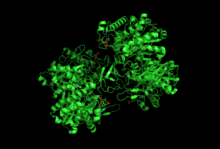Acetyl-CoA C-acetyltransferase
In enzymology, an acetyl-CoA C-acetyltransferase (EC 2.3.1.9) is an enzyme that catalyzes the chemical reaction
- 2 acetyl-CoA CoA + acetoacetyl-CoA
| acetyl-CoA C-acetyltransferase | |||||||||
|---|---|---|---|---|---|---|---|---|---|
 Crystallographic structure of the tetrameric acetoacetyl-CoA thiolase (EC:2.3.1.9) from the Gram-negative bacterium Z. ramigera.[1] | |||||||||
| Identifiers | |||||||||
| EC number | 2.3.1.9 | ||||||||
| CAS number | 9027-46-7 | ||||||||
| Databases | |||||||||
| IntEnz | IntEnz view | ||||||||
| BRENDA | BRENDA entry | ||||||||
| ExPASy | NiceZyme view | ||||||||
| KEGG | KEGG entry | ||||||||
| MetaCyc | metabolic pathway | ||||||||
| PRIAM | profile | ||||||||
| PDB structures | RCSB PDB PDBe PDBsum | ||||||||
| Gene Ontology | AmiGO / QuickGO | ||||||||
| |||||||||
Hence, this enzyme has one substrate, acetyl-CoA, and two products, CoA and acetoacetyl-CoA.
Acetyl-CoA C-acetyltransferase belongs to the thiolase family of enzymes.
This enzyme belongs to the family of transferases, specifically those acyltransferases transferring groups other than aminoacyl groups. The systematic name of this enzyme class is acetyl-CoA:acetyl-CoA C-acetyltransferase. Other names in common use include acetoacetyl-CoA thiolase, beta-acetoacetyl coenzyme A thiolase, 2-methylacetoacetyl-CoA thiolase [misleading], 3-oxothiolase, acetyl coenzyme A thiolase, acetyl-CoA acetyltransferase, acetyl-CoA:N-acetyltransferase, and thiolase II. This enzyme participates in 10 metabolic pathways: fatty acid metabolism, synthesis and degradation of ketone bodies, valine, leucine and isoleucine degradation, lysine degradation, tryptophan metabolism, pyruvate metabolism, benzoate degradation via coa ligation, propanoate metabolism, butanoate metabolism, and two-component system - general.
Isozymes
Human genes encoding acetyl-CoA C-acetyltransferases include:
|
| ||||||||||||||||||||||||||||||||||||||||||||
References
- PDB: 2WKT; Meriläinen G, Poikela V, Kursula P, Wierenga RK (November 2009). "The thiolase reaction mechanism: the importance of Asn316 and His348 for stabilizing the enolate intermediate of the Claisen condensation". Biochemistry. 48 (46): 11011–25. doi:10.1021/bi901069h. PMID 19842716.
Further reading
- LYNEN F, OCHOA S (1953). "Enzymes of fatty acid metabolism". Biochim. Biophys. Acta. 12 (1–2): 299–314. doi:10.1016/0006-3002(53)90149-8. PMID 13115439.
- Stern JR, Drummond GI, Coon MJ, del Campillo A (1960). "Enzymes of ketone body metabolism. I. Purification of an acetoacetate-synthesizing enzyme from ox liver". J. Biol. Chem. 235: 313–317. PMID 13834445.